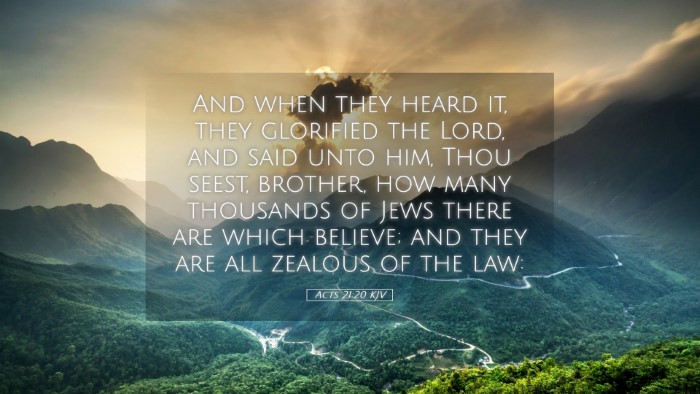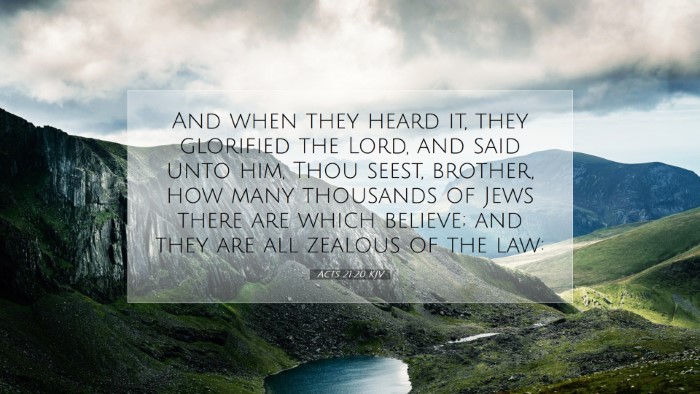Commentary on Acts 21:20
Acts 21:20 states: "And when they heard it, they glorified the Lord and said unto him, Thou seest, brother, how many thousands of Jews there are which believe; and they are all zealous of the law." This verse occurs in the context of Paul’s visit to Jerusalem and the response of the Christian leaders to his ministry among the Gentiles. This commentary synthesizes insights from several public domain sources to provide a thorough analysis of this significant text.
Context of the Passage
Before delving into the verse, it is essential to understand the situation surrounding Paul’s visit to Jerusalem. He was returning from his missionary journeys, and the church leaders were eager to hear about the work he had done among the Gentiles. Paul narrates the conversion and the powerful works of God among the non-Jews, which leads to a remarkable response from the Jerusalem church.
Analysis of the Verse
This verse serves as a pivot around which themes of Jewish identity, the law, and the acceptance of Gentiles in the early Church revolve.
Rejoicing and Glorifying God
“And when they heard it, they glorified the Lord…” The reaction of the Jerusalem apostles emphasizes the importance of acknowledging God’s work. Albert Barnes notes that genuine rejoicing in the church often comes from recognizing the work of God—this act of glorification is communal and reflects a collective spiritual health.
Significance of Corporate Praise
Matthew Henry draws attention to the importance of community in faith: this response is indicative of a healthy church. When God’s grace is witnessed, as in the cases of conversions, the natural outflow for believers should be praise and thanksgiving.
The Reality of Believing Jews
“...and said unto him, Thou seest, brother, how many thousands of Jews there are which believe…” This acknowledgment of many Jewish converts is crucial. Adam Clarke highlights that this demonstrates the power and reach of the gospel among the Jewish populace. The phrase “many thousands” indicates a significant movement of the Holy Spirit among the Jews, dispelling any notions of Christianity being a fringe movement restricted to Gentiles or marginalized groups.
Theological Implications
This multitude of Jewish believers exemplifies the inclusivity of the gospel. While the focus of this verse is on Jewish converts, it also anticipates the broader mission to Gentiles, reinforcing that God's plan is both for Jews and Gentiles alike. This reflects the earlier prophetic traditions and teachings of Jesus regarding the fulfillment of God's promises to Israel and the extension to all nations.
Zeal for the Law
“...and they are all zealous of the law.” The phrase “zealous of the law” reveals the complexity of the early believing community. The Jewish Christians maintained a strong allegiance to their traditions and laws as a sign of their heritage and faith. Both Matthew Henry and Albert Barnes point out that this zeal does not contradict their acceptance of Christ but rather shows that they see Christ as the fulfillment of the law rather than its abolition.
Balancing Tradition and Faith
This comment highlights a tension present in early Christianity. Paul, when referring to his ministry, often emphasized salvation by grace apart from the works of the law. However, the Jerusalem church was evidently still grappling with their identity and practices. The Jewish believers' zeal demonstrates a deep-seated commitment to their religious heritage while also embracing the new covenant. Adam Clarke notes that understanding this tension is critical for modern readers who frequently negotiate their own traditions and newfound beliefs.
Lessons for Today
The interaction in Acts 21:20 offers several lessons applicable to contemporary believers:
-
The Call for Unity: It underscores the necessity for unity among diverse groups of believers. Both Jewish Christians and Gentile Christians are part of the same body, and there should be mutual respect for backgrounds and practices.
-
Recognizing God’s Work: Believers today are encouraged to glorify God when witnessing His handiwork, fostering a sense of community and collective joy in the Gospel's expansion.
-
Embracing Heritage: Like the first-century church, modern believers can cherish their cultural and religious heritages. The challenge lies in balancing tradition with the transformative message of Christ.
Conclusion
Acts 21:20 provides a profound insight into the early Church's dynamics, depicting a thriving community of Jewish believers who valued their heritage while celebrating the expansive work of God through Paul among the Gentiles. The interplay of glorifying God, recognizing a multitude of Jewish converts, and their zealousness for the law prompts a deeper reflection on how faith can coexist with cultural identities today. As contemporary Christians navigate similar challenges, this passage serves as an enduring reminder of the beauty of unity in diversity under the lordship of Jesus Christ.


